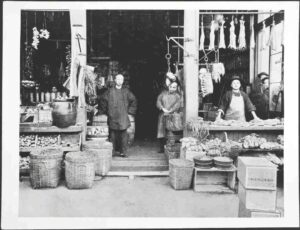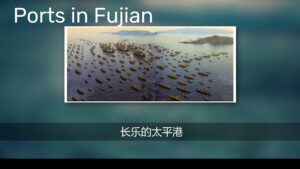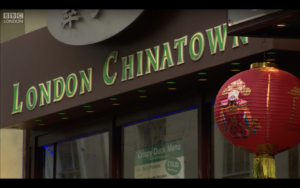Hokkien (/ˈhɒkiɛn/) is a Southern Min language originating from the Minnan region in the south-eastern part of Fujian Province in Southeastern Mainland China and spoken widely there. https://en.wikipedia.org/wiki/Hokkien

The Changle and Fuqing regions of Fujian have very little arable land per capita as they are backed by mountains and have very little land. The harbour and coastline were the strengths of this region, so most people also worked as “seafarers“.
The earliest Fuzhou migrants were the so-called ‘ship-jumpers’, a term used to refer to ships arriving overseas and the crew being illegally stranded abroad. In the two decades after the Second World War, a small number of Fuzhou seamen employed by Hong Kong shipping companies ‘jumped ship’ and stayed abroad.
After 1972, the Chinese government opened up overseas Chinese families (including those of Hong Kong and Macau compatriots) in Fujian and Guangdong to leave the country to visit their relatives, and many Fuzhou people emigrated to Hong Kong.
Many of the family members of those who had originally had Hong Kong passports moved to Hong Kong first and then legally emigrated from Hong Kong.
A small number of men who arrive in Hong Kong still choose the “boat-hopping” method because they do not have American relatives to help them apply for admission to the United States. Once these Fuzhou people became legal residents, they began a chain of migration based on kinship and geography, resulting in a wave of mass migration of Fuzhou people.


The history of Hokkien in the UK is not long and can be divided into several stages:
Firstly, around 1990, the first group of Fujian pioneers came to the UK, most of them entered legally as students or workers;
Secondly, in 1993, the first group of Hokkien stowaways entered the UK;
Thirdly, the period 1995-2000 was the high point of smuggling into the UK, and most of the Hokkien currently in the UK landed during this period. Due to the large number of sudden arrivals and the shortage of employment opportunities, there was a more chaotic situation.
Fourthly, after the Dover tragedy in 2000, the influx of people smuggling gradually cooled down. At the same time, there was a tightening of border control in the UK and refugee claims became more difficult.

New directions of movement. Some of those who had been granted legal status began to bring their families to the UK for reunion; some of those who felt that they had no hope of getting status, saved up a sum of money and returned home.
From the countryside through the snakeheads smuggled out – work as a Chinese restaurant floor handyman for 2-3 years – chef for 3-5 years – takeaway shop, and then seek a new development, this is 90% of British Hokkien pattern of development. Most of them are not highly educated, do not know foreign languages and basically live in a circle of Hokkien, but are generally very willing and able to work hard. After all these years of development, most Hokkien have passed the stage of being handymen in restaurants. A significant proportion have entered the stable income chef stage, and the quotes in Chinatown show that Hokkien are no longer a minimum wage group.
The Fellowship estimates that nearly 30% of the 80,000 Hokkien have made it above the takeaway shop level. Hokkien now hold 2/3 of all Chinese takeaway outlets in the UK and are still growing. The Chinese interior decoration industry is also dominated by Hokkien, but the Hokkien are only part-time workers, up to small foremen for subcontracting projects, the real foremen are Hong Kong or Malaysian Chinese.

Today, there are around 80,000 Hokkien in the UK, the largest group of 300,000-400,000 Chinese in the UK after Hong Kong and Cantonese, with the largest concentrations in London, Manchester and Birmingham.
https://asia.nikkei.com/Life-Arts/Life/Hong-Kong-exodus-set-to-boost-U.K.-restaurant-sector
http://news.bbc.co.uk/1/hi/world/asia-pacific/799055.stm
Because the survey was conducted mainly among Chinese Hokkien. so some of the information consulted is in Chinese.
https://ishare.ifeng.com/c/s/7r2XgizKW0P
“World Nation” 2006 Issue 3 (Author: Zhuang Guotu)
https://travel.sina.cn/outbound/2010-07-05/detail-ifxprupc9921251.d.html?from=wap
https://posts.careerengine.us/p/5cdcd86e94da8270af6b8cc7
https://xw.qq.com/cmsid/20201104A02VD100
https://web.6parkbbs.com/index.php?app=forum&act=view&bbsid=2071&tid=1148481


Leave a Reply